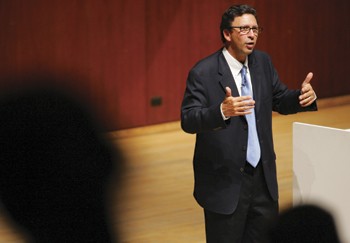
Frank Sesno speaks to students about media ethics at the Sammons Media Ethics Lecture held in the Caruth Auditorium Wednesday night. Sesno, a professor at George Washington University and special correspondent for CNN spoke on a variety of ethical issues and answered questions from the audience. (John Schreiber)
Frank Sesno, an award-winning journalist and special correspondent for CNN, delivered the eighth annual Rosine Smith Sammons Lecture in Media Ethics yesterday evening. Sesno discussed the importance of the media to remain ethical in a rapidly-changing world.
“Media ethics is the core of journalism,” said Sesno. “Every day, we are faced with the decision of what to cover and what not to cover.”
The Sammons Lecture is presented by the Division of Journalism in the Meadows School of Arts. It is named after Rosine Smith Sammons, an SMU alumna.
Sesno began the lecture by discussing the personal dilemmas he faced while at CNN. He recalled having the press secretary in Washington caution him about the coverage of Sept. 11 and the deployment of troops.
“I had to remember that what I reported would be seen in Albany and in Afghanistan,” he said. “We had to decide what we would and wouldn’t report on the troops…Our decision was to still report the information, but to report it with sensitivity.”
Sesno recalled another incident where he had the opportunity to personally interview President Reagan. The catch was that Sesno would be limited to only discussing the Panama defense force.
“I didn’t get that interview,” he said. “But that’s okay. I didn’t want to be dictated by the White House on what I could report.”
The subject was then changed to technology, and the goal of news organizations to be the first to break a story. Sesno said that this often leads to holes in the reporting and the shift from focusing on the issues.
“We (the media) need to force ourselves out of the horse race and onto the issues,” said Senso. “I’m talking about war, peace, immigration and outsourcing.”
Sesno also provided statistics about how the public perceives the media. According to Sesno, 53 percent think newspapers are inaccurate and 32 percent think that journalists are immoral.
This can be changed, said Sesno. He said journalists must be accountable for their reporting by discussing only the facts without speculation.
“Our purpose as journalists is to inform the public to make informed decisions,” he said. “It’s not a popularity contest among media outlets, it’s about being responsible.”
Sesno is currently the professor of media and public affairs at George Washington University in Washington D.C. Sesno is a CNN veteran, where he has covered the Middle East peace talks and the 50th anniversary of D-Day from Normandy.









